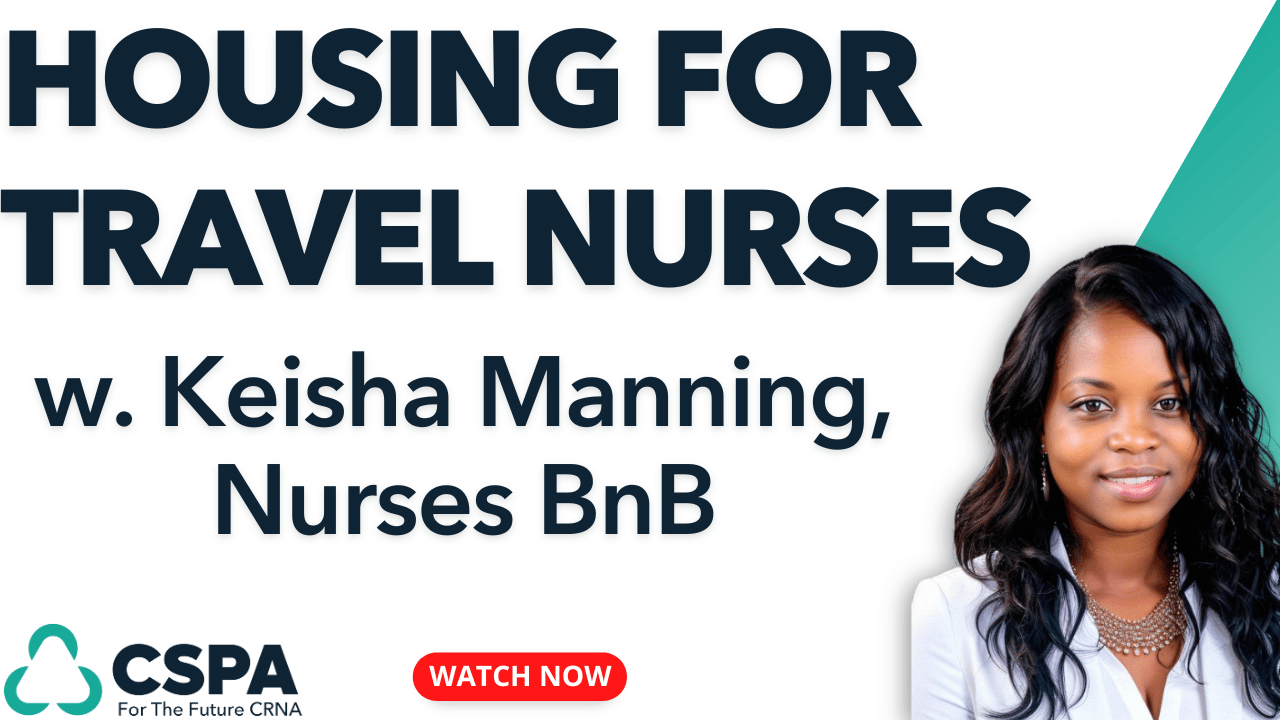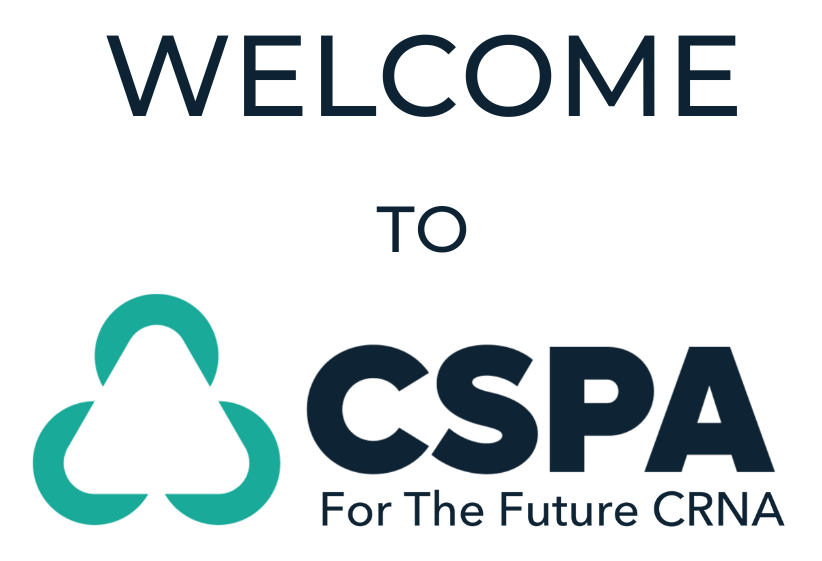
Get Your Free CRNA School Interview Prep Guide
Free CRNA School Interview Prep Guide Click Here
Clinical rotations are not just about testing knowledge; they’re a chance to become the confident SRNA you want to be. In this episode, we have guest hosts and Nurse Anesthesia Residents Cordero and Monica to share their experiences and insider tips for all SRNAs starting clinical rotations. They discuss the expectations set by preceptors on your very first day and week in clinicals. Together, they share how to come prepared, know your patients, and handle machine checks like a pro. They also talk about the mystery of care plans, the word “pimping” in the medical field, the Vargo app, and more. Tune in now!
Have you gained acceptance to CRNA school? Congratulations! Prepare with the #1 pre-anesthesia curriculum, as recommended by CRNA program faculty. Start the NAR Boot Camp today: https://www.cspaedu.com/bootcamp
Get access to planning tools, mock interviews, valuable CRNA Faculty guidance, and mapped-out courses that have been proven to accelerate your CRNA success! Become a member of CRNA School Prep Academy: https://www.crnaschoolprepacademy.com/join
Book a mock interview, personal statement critique, resume review and more at https://www.TeachRN.com
Join the CSPA email list: https://www.cspaedu.com/podcast-email
Send Jenny an email or make a podcast request!
Hello@CRNASchoolPrepAcademy.com
—
Watch the episode here
Listen to the podcast here
Tips For SRNAs Starting Clinicals With Guest Hosts Cordero And Monica, NARs
Future CRNA, welcome to the show. I have a very special episode lined up for you. It is part of our Guest Host Series, where I am bringing SRNAs on the show for you as a guest host on the show. My thought process behind doing this is I wanted you to hear from a variety of students who are at different stages of their CRNA journey and allow you to step into their world and hear them talk about what it’s like to be a student dealing with things like difficult preceptors or different anesthesia or clinical topics, maybe even things like time management, stress management, and things like that.
These episodes are going to be gold. I hope you enjoy it as much as I always do. Hearing from students, I know for a fact that the reason why CRNA Prep Academy is where it is now, and the reason why I have learned so much, is from diving all in and listening to students along with CRNAs share a wealth of information. I’m taking all of that information and compiling it into the system that we have created. I know that you’re doing the same thing by tuning into the show week after week, developing your own method, strategy, and system for success. I hope you enjoy these guest episodes. Let’s go ahead and get into the show.
—
In this episode, Monica and I are going to talk about tips for SRNAs that are about to enter their clinicals training. Before we get into the episode, we do want to thank Jenny and the staff at CRNA School Prep Academy for giving us a platform to be able to share with you guys. Let’s get into it.
Welcome to A Couple Nurses. It’s your girl, Monica.
My name is Cordero.
For this episode, we have a few topics that we want to share with you guys, especially since I’m approaching my fifth month in clinical, I believe.
I’m approaching my first day in clinical. You call yourself a veteran.
I do not call myself a veteran.
You’re five months deep.
I’m still a baby. Please, help.
In this episode, I want to ask Monica about some things that I can do to prepare an SRNA going into clinical for the first time. We both come from front-loaded programs.
Semi-front-loaded program.
We’ll dive into the topics. I have a couple of things I want to ask Monica about but before we get too far into the episode, be sure to like, share, and subscribe. Leave any comments that you have. Give us five stars on whatever platform you use. We appreciate the support.
Show your love.
Expectations The First Day Of CRNA School
The very first question I wanted to ask you is, what are the expectations from your preceptors on the very first day or first week as you enter clinical?
I thought on my very first week of clinicals that they were expecting us to come prepared. Know your patient, especially that very first patient. Try to do as much digging as you can even though it’s going to be overwhelming or be super slow with the medical record. Look through it. Try to look at your other patients and see anything that stands out. Come in ready to learn. Be eager and excited. It is being that personable person and being able to read the room and mesh with that CRNA that you are with that day. Those are the expectations.
Know all your drugs. It depends on what program you’re in. For us, we’re in a front-loaded program. We’ve covered a lot of our pharmacology classes already or at least I have. You’re done with yours. Other programs are a little bit more integrated where they haven’t. It depends on where you’re at in your program. For me, I made sure that I came ready for business on whatever drugs I was planning on administering. I was making sure that whatever drugs my patient was taking at home, I had a good knowledge base on them. It’s being prepared and knowing your patient. Be cool and calm. They know you’re nervous.
What about little things like machine checks?
The machine check is huge.
Are they going to expect you the first day to walk in and be able to perform a complete machine check?
I think so. That’s something that depends on the program that you went into. From my experience, we do have the luxury of having a lab in our program so I put my hands on these machines. The machine that I do have in clinical is different from the one I had practice in. That’s all about how you ask for help and things like that. On the very first day that we had a tour of the facility, I asked our preceptor, “How do you do a machine check up on this? We didn’t use this one before. We practice on a bellows machine in the lab and this one’s piston-driven. I reviewed my machine before but I also had no idea how to do a machine check on this.” You can do some YouTubing. Everything’s on the internet. If you’re that eager, you can go ahead and do that but it’s okay to ask them, “How do I do a machine check on this?”
I was wondering about that. We’re going to read this episode again and be like, “That was such a dumb question.” I remember learning about piston-driven machines. Do they have that artificial sound of the bellows?
It’s so annoying. It has a breathing sound. I like to turn mine off.
You don’t like the sound?
I don’t like it. It’s too loud.
They say it gives some people comfort.
It doesn’t give me comfort. It makes me anxious. I’m like, “Stop.” As long as patient stats are good and tidal is good removing air with the bag, I’m good. To wrap up on that question, be prepared. Somebody’s going to ask you a question. Are you going to know the answer? You may or may not and that’s okay. Having a positive mindset, being eager to be at clinical, and being super excited is going to show.
Being willing to put yourself in an uncomfortable situation even in those first couple of weeks, it’s going to show and shine through. Be prepared and remind yourself that you’re starting at the bottom of the barrel again. We all were once that ICU nurse. We felt comfortable in our role as we were still developing as a bedside nurse but this is different. Have a little bit of grace.
Care Plans In CRNA School Clinicals
The second question aligns with the expectations. Are they going to be expecting you to have care plans prepared? Do you prepare care plans for yourself? What about care plans?
Care plans suck. Let me start by saying that I see the value in them but depending on how your care plan is structured and whatever program you’re in; It’s part of that process that you have to go through. Whether I’m following the structure of my school or not, I still like to do some form of a care plan and planning, whether that’s in my head, on a piece of notebook paper, or whatever the case may be.
There’s nothing better than coming into your room and the machine is checked off. You have everything drawn up already and you have all the tools that you need for that assignment. The CRNA walks in and you introduce yourself like, “This is what I was thinking for this patient. It sounds good.” They may not go with it and that’s fine but at least you came with the plan and you were ready. You know your patient.
Care plans, there is value in them. They are extremely time-consuming. Especially around the time when I was in my program when I first started clinical, we had to do one every single day. It’s still an expectation for us so I still will do one, especially for new, hard cases. It can be extremely helpful. Not relying on one source is key. Don’t go to Vargo. We all want to do it. Open up Barash, Nagelhout, or whatever the case may be. Jaffe and YouTube are good.
When you say sometimes you make these mini-care plans, do you write those down or is that something that’s in your head?
It’s in my head. It depends on how you can remember things and how your brain functions.
I have to write things down. I have note cards or something.
That’s fine. It’s whatever works for you and whatever makes you comfortable. There’s a very good chance that you’re going to forget. I don’t know. The way that my brain works sometimes, I’ll be like, “They got this and this. I’m going to do this.” I’ll have a couple of options in my brain. Overall, honestly, as much as the care plans suck, I do find some value in them, whether you’re doing your own or following whatever template that your school gave you.
Having a positive mindset, being eager to be at clinical, and being super excited is going to show. Share on XBe prepared because some preceptors are going to ask you for your care plan. They’re going to want to physically see, “Here’s a care plan.” It depends on how your clinicals coordinator at your school communicates with your clinical coordinator at your site. Do your care plans. We signed up for this. We prayed for this moment. We are excited to be here. It’s super time-consuming and we have no life but it’s part of the game. At the end of the day, you put yourself in that situation. Do things the right way.
I feel like it should be a very intuitive thing that if you’re starting clinicals, care plans seem like they would make sense. Even once we get into our careers as CRNAs, we need to have some kind of plan and backup plan. That’s the base and foundation of everything that we do. If you put somebody to sleep, what is your plan? What are you expecting to happen throughout the case?
If something bad happens, then you’re like, “I planned for this. I know exactly what I have to do.” You may not know how to mix that medication but you know that that’s what you want to grab.
You’re not having to think.
You’re halfway there already. It makes a huge difference from that. Especially at the beginning of clinicals, we don’t know anything. The least that you can do is come prepared for clinicals and have a care plan ready to go. It’s time-consuming because sometimes, you don’t know exactly where to find things. That honestly comes with time and it’s going to get a lot better.

SRNA Clinicals: Having a positive mindset and being eager to be at clinicals is going to definitely show.
I can tell you there have been so many times when I like to make sure I’m there for that very first assessment if I’m not able to do my first initial assessment by myself. It depends on what kind of facility you’re at. I’m listening to the anesthesiologist while they do their assessment and I’m like, “I know what they’re talking about. This was on their MAR.” They’ll ask them a specific question.
Patients can’t remember everything. We’ve all been in healthcare. We know how patients can be sometimes and it’s part of life. When you know something that the physician doesn’t know, because you’re in this team model, it feels so good that you were able to help write, add to the sequence of events and the plan, and be able to formulate it together. It feels good.
You’re like, “I knew that.” They’re like, “How’d you know that? Where’d you find that?” I’m like, “I found it here on this extromedias or whatever in the chart.” If you do your digging, it’s going to show. You’re going to be thanked for it or not going to be thanked for it. It’s going to be good that you’re well-prepared. At the end of the day, depending on what model you’re doing your clinicals at, it’s a team dynamic. Everyone helps each other out.
What Is “Pimping” In CRNA School?
I’m going into another question when we’re preparing for clinicals. What about pimping? I’ve heard about pimping. A lot of SRNAs are scared about getting pimped. Have you been pimped? What kind of things have you been pimped on?
I’ve been pimped. Sometimes it’s the randomest drug fact that you barely covered in class. It was at the end of the bottom of the note or maybe something that you forgot. I can do well under pressure. I believe I can, especially in traumas and stuff. Sometimes, my struggle is having to understand, “What are you asking me?” I’ll miss the question because I’m like, “I have no idea you’re being trivial with me. I knew that. Why’d you make it so difficult?” I’ve been pimped on what’s in OFIRMEV and other ingredients are in OFIRMEV. It’s mannitol. They wanted to know exactly how much.
Another question was a patient who has an allergy to pork or something like that. They’re like, “You’re in the cath lab. What medication do you have to think about not giving?” It’s heparin. There are some weird trivia questions but if you do your care plan, you know what you’re talking about, especially in rooms like thoracotomies, one-lung ventilation, and understanding the physiology and the anatomy especially when you’re putting down the fiber optic tube and things like that. Being able to read your ventilator numbers and knowing how to intervene if your patient starts to desat, all those things are very important.
If you are going to do your care plan and you’re smart and you got it down, send me those vibes. Prepping for a case, do it. It makes you look better and more prepared. These are patients’ lives. Why would you go into something so unprepared? It’s not going to make you look better and you’re not going to be able to evolve as a student. You’re not going to make yourself any better.

SRNA Clinicals: These are patients’ lives. Why would you go into something so unprepared? You are not going to evolve as a student if you are not prepared.
Quite frankly, it sounds lazy. Some people have this photographic memory that they can think on the fly. That’s how some people work. The last thing I want to ask is what are some supplies and stuff that you should get for the first day? You did a video in the past about your little Lululemon bag. What would you recommend people get prior to their first day of clinicals as an SRNA?
Supplies And Tech Needed
I remember I did my little dupe Lululemon bag. Some people would disagree with having a train-of-four monitor on you because most rooms will have one. I was intubated in PACU one time. I pulled down my little handy dandy train-of-four. It was very useful. That’s what I’ve had in mind. I like having a little Sharpie on my badge buddy holder. That’s super important. A pen is super important too. I like having my little stethoscope holder because there’s nothing more uncomfortable than putting that around your neck, especially all day, and then it’s swinging in somebody’s face while you’re trying to intubate. It doesn’t look good. Pack a little lotion and some chapstick because one of them is going to get dry.
I saw you got some new shoes too. She bought three pairs of shoes for clinicals. I have three pairs of shoes.
I only used two. I got some New Balances, On Clouds, and Adidas. I have three pairs of shoes because I was trying to find the perfect shoe. I found them. I like the On Clouds a lot but I need to try a different model because my little shins are starting to hurt. I tried the New Balances. They are super comfortable but too fluffy for me. I feel like I’m going to break my ankle on them. Hokas are ugly.
For the longest time, I was trying to tell her about these Hokas and how ugly they were.
Luckily, I went and tried them on and they hurt my feet. They’re out of the equation. I’m sorry for those who love the Hokas. They’re not for me. I’ve talked about this before in some of our other episodes. If you do not have the Notability app, please grab that.
For clinicals?
Yes. There’s a Notion app. I do Notion for all of my classes. There have been so many times when I’ve popped up my Notion app and searched for something that I had forgotten about some drug and it was right there.
It’s Notion, not Notability.
Both. With Notability, that’s where I have all my class notes that I’ve ever taken or that have ever been distributed to us. I also have a certain folder where I have my care plans so anytime I forget something, I’m going to open it up in my phone and be like, “It’s right there.” Download the Notability. Transfer all of your notes from all your classes. Have them all organized because it has the search option. Maybe I made X and I forgot my dosing or something like that. It’s your first thing and you’re like, “What do I give?” It’s right there. It’s so easy.
The Vargo app is super useful. I love the Vargo app, especially if I prepped for all these cases. Let’s say one of them gets canceled and I have no idea what we’re doing for this other one. I do a quick little search and it saves me for the day. Those are some tips that I would recommend for the first day of clinicals in general, to be honest.
Those are the topics I want to hit. Is there anything else that you want to add for first-day clinicals?
Honestly, you’re going to be so nervous.
I’m so nervous. I can’t even lie.
I remember being in the parking lot and I was like, “Here goes nothing.” I was paired with the chief. Those nerves got extremely heightened as soon as I found out that he was the chief. If nobody would have told me he was the chief, I would have been like, “Let’s do this thing.” It was supposed to be one observation day and we went straight to intubating and learning.
The nerves were still there. They decreased a little bit. I don’t want to say this is my calling but it was one of those feelings where I felt like, “I’m where I’m supposed to be.” It’s such a bittersweet moment because you have all this anxiety. You’re so tired and sleep-deprived. You’re trying to keep up with classes if you’re still taking classes. At that moment, I remember going to the bathroom and was like, “I love this. This is so much fun.”
Going into the rest of your clinical days, you are going to be miserably tired. It is about changing up your mindset, training your mindset, and telling yourself this is the only time that you’re going to be getting your handheld on making such important decisions intraoperatively, preoperatively, and postoperatively. Think of it like that. When you graduate, you’re going to be on your own. You have your people to rely on but this is the one time where you’re able to bounce those ideas off of somebody else who’s been doing this for a lot longer.
It’s all about mindset. Stay positive and driven. Ask questions. Be personable. Don’t be a know-it-all. Don’t be rude. Read the room. Be nice to your techs, OR circulators, and everyone. You never know when somebody’s watching so do your thing. You are going to kill it out there. If you’re prepping for clinicals for the very first time or thinking about going to CRNA school, this journey is so long. I’m still so tired. I’m studying for a test.
Are you still nervous?
I am nervous sometimes when I go into new procedures. I remember when I went into my first cath. You’re always going to be nervous. Being nervous is such a good and important feeling to recognize for yourself because it means that you care. You want to be as good and prepared as you can be. It’s all part of the process.
Being nervous is such a good and important feeling to recognize for yourself because it means that you care. Share on XThose are good words. You gave people some encouragement out there. I would feel inspired and ready because I feel like I do possess some of those. If nothing else, I can show up enthusiastic and open to learning. I can prepare the best that I can. Doing those things sets you up so it’s good to hear that.
You’re going to be great. You’re going to kill it. For all those who are reading and it’s your first day of clinicals coming up soon, you got it. Come prepared and be personable.
Thanks for reading the episode. We’ll talk to you next time. Peace.
Important Links
- A Couple Nurses – YouTube
Have you gained acceptance to CRNA school? Congratulations! Prepare with the #1 pre-anesthesia curriculum, as recommended by CRNA program faculty. Start the NAR Boot Camp today: https://www.cspaedu.com/bootcamp
FREE! CRNA School Interview Prep Guide: https://www.cspaedu.com/irptwqbx
Get access to planning tools, mock interviews, valuable CRNA Faculty guidance, and mapped-out courses that have been proven to accelerate your CRNA success! Become a member of CRNA School Prep Academy: https://www.crnaschoolprepacademy.com/join
Book a mock interview, personal statement critique, resume review and more at https://www.TeachRN.com
Join the CSPA email list: https://www.cspaedu.com/podcast-email
Send Jenny an email or make a podcast request!









